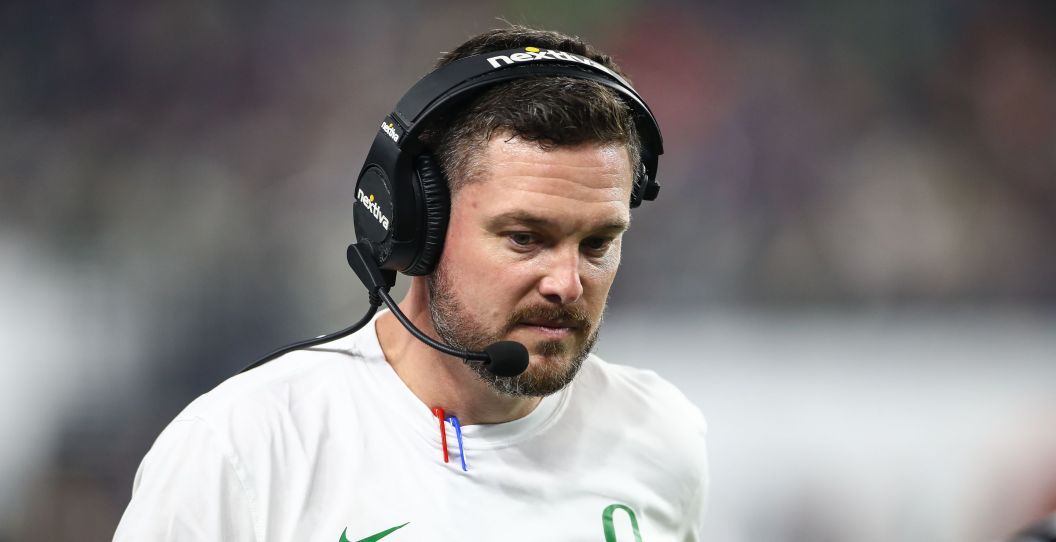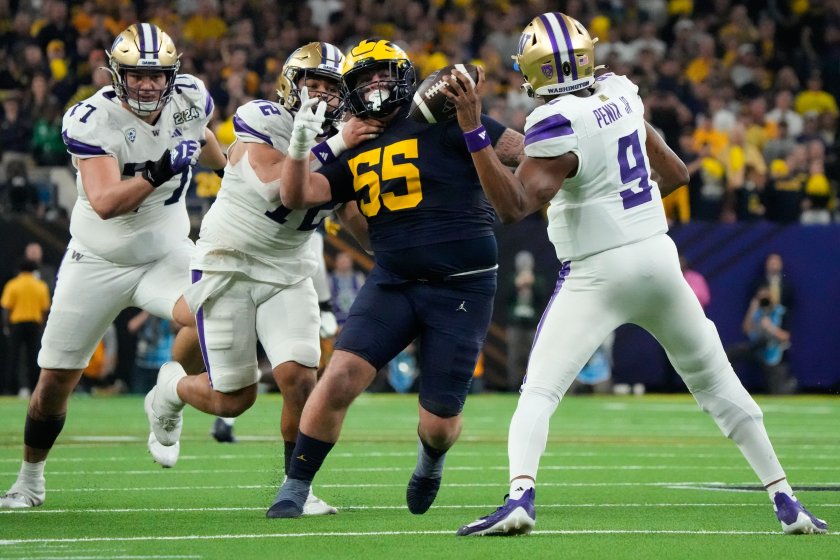Outside of a crazy coaching hiring cycle and perhaps the transfer portal, the biggest story going into the next college football season is realignment. While Texas and Oklahoma really kicked things into high gear by announcing a move to the SEC, the Pac-12's biggest programs might have made an even bigger wave, as four of the top West Coast programs are going over to the Big Ten.
Videos by FanBuzz
In addition to USC, UCLA, and final Pac-12 champion Washington, Oregon is heading into the conference. Of the Big Ten's new member schools, the Ducks are probably the best positioned for success going forward, but there's a big question to be asked.
After Washington ripped through the Pac-12 and ran past the SEC-bound Texas Longhorns at the Sugar Bowl semifinal, they were completely stifled by the Michigan defense in the national title game, while also failing to slow down the Wolverines' physical ground attack. So, one is left to wonder whether Washington and the other Pac-12 teams entering the Big Ten can adjust to the physical play style that has long defined the traditionally-Midwestern conference.
https://twitter.com/Ducks_Wire/status/1751236226772779270
Oregon's head coach Dan Lanning has a bit of a different take. He thinks it'll be a tougher adjustment for the Big Ten teams seeing the West Coast style for the first time, especially when it comes from his Ducks. This is a bold angle considering the Michigan-Washington result, but is it really wrong?
Lanning is an interesting figure to start this conversation. His background is in defense, and much of his experience came at Georgia, a strong defensive school in a conference traditionally seen as "tougher" and more physical than the Pac-12, much like the Big Ten.
It's worth noting that Michigan in particular is not really the problem for Oregon and their counterparts next year. The Wolverines have lost a lot, both in terms of talent and coaching, with departing legends in quarterback JJ McCarthy, running back Blake Corum, defensive coordinator Jesse Minter and of course head coach Jim Harbaugh.
Still, the Big Ten is a tough, physical conference, that contained each of the four best scoring defenses in FBS this year. Iowa will always be a defensive juggernaut, Penn State retains a lot of talent, and Ohio State should be the best defense in the country after reloading in the transfer portal. Can Oregon, Washington, USC and UCLA deal with the heat, or will they be relegated to tier 2 or worse in their new conference?
In the short term, the answer is pretty complicated. Much of the Big Ten will be experiencing a down season next year, so even with an offense-first approach, Oregon and USC should be able to compete. That being said, Ohio State should blow them both out of the water, but the Buckeyes are so good that the same could be said of almost every team in the country, including the classic Big Ten powers and even blue bloods like Alabama.
Eventually, these teams will adapt, even if only in part. There's some truth to what Lanning had to say; by many measures, Oregon was the country's most efficient offense last year, and they run a very different system than what most Big Ten defenses are used to seeing. It could be an extremely prolific year for the Ducks offensively, and USC could be in good shape in that regard as well. There's no reason these teams can't keep running their current offenses with a good degree of success in the Big Ten, as long as they stock up on offensive linemen to better control the line of scrimmage.
However, to get all the way to the top of the conference, these teams will likely need to improve a good bit on defense. We've seen it before when the two conferences have met; seeing a truly elite defense for the first time all year was a death knell for the Pac-12 in its only two College Football Playoff final appearances, the first-ever under the four-team format fought between Oregon and OSU, and the final one under that format between Washington and Michigan.
Conversely, when Big Ten teams have come up against Pac-12 defenses after battling through their conference slate all year, they've often lit up the scoreboard, even if that wasn't their weekly norm. Even mediocre offenses can take an immediate step up when facing a poor defense, but conversely, a great offense can fold when seeing creative new defensive looks for the first time, and dealing with a different level of physicality at the line of scrimmage.
Lanning in particular is a great recruiter and strategist; even if his Ducks falter in year one, he'll find a way to get the right personnel and scheme in place to succeed. But it's truly unfortunate for his Ducks and USC that a year that could be so successful comes in such a transitional period.
Change is always challenging, especially when that change involves a tremendous travel disadvantage, and perhaps just as big of a downside in terms of style of play. In today's era of college football, big brands with equally-sized financial resources will usually land on their feet eventually, so the future is bright for these West Coast powers coming to the Midwest- they just might have to wait a little while to enjoy some success.

